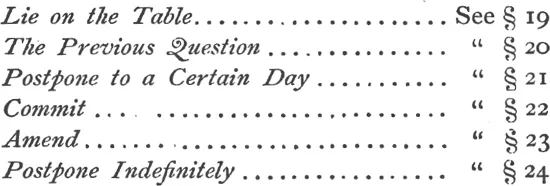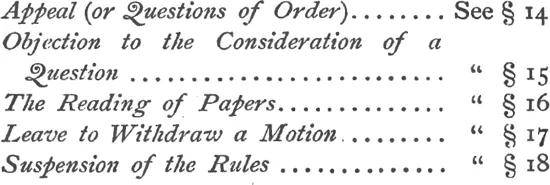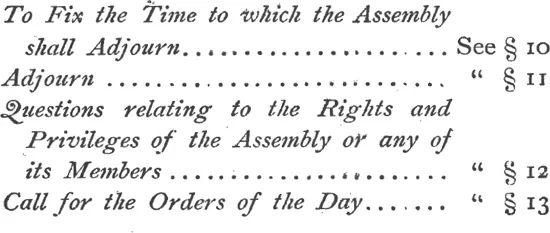
eBook - ePub
Robert's Rules of Order
The Original Manual for Assembly Rules, Business Etiquette, and Conduct
Henry Robert
This is a test
Share book
- 200 pages
- English
- ePUB (mobile friendly)
- Available on iOS & Android
eBook - ePub
Robert's Rules of Order
The Original Manual for Assembly Rules, Business Etiquette, and Conduct
Henry Robert
Book details
Book preview
Table of contents
Citations
About This Book
Robert's Rules of Order was originally published in 1876, as a guide for groups when they met to maximize the efficiency of their meetings and conduct their business in an orderly fashion. The book highlights how to properly motion for an argument or change, and the subsequent steps required for a motion to pass. Additionally, it elaborates on decorum, etiquette, voting procedures, positions within the group, and more. With a new foreword by Chris MacDonald, author of The Business Ethics Blog, this edition is sure to provide readers with the most comprehensive version of Robert's classic guide. It's sure to make meetings run more smoothly, and help whatever your cause achieve greater success.
Frequently asked questions
How do I cancel my subscription?
Can/how do I download books?
At the moment all of our mobile-responsive ePub books are available to download via the app. Most of our PDFs are also available to download and we're working on making the final remaining ones downloadable now. Learn more here.
What is the difference between the pricing plans?
Both plans give you full access to the library and all of Perlego’s features. The only differences are the price and subscription period: With the annual plan you’ll save around 30% compared to 12 months on the monthly plan.
What is Perlego?
We are an online textbook subscription service, where you can get access to an entire online library for less than the price of a single book per month. With over 1 million books across 1000+ topics, we’ve got you covered! Learn more here.
Do you support text-to-speech?
Look out for the read-aloud symbol on your next book to see if you can listen to it. The read-aloud tool reads text aloud for you, highlighting the text as it is being read. You can pause it, speed it up and slow it down. Learn more here.
Is Robert's Rules of Order an online PDF/ePUB?
Yes, you can access Robert's Rules of Order by Henry Robert in PDF and/or ePUB format, as well as other popular books in Betriebswirtschaft & Unternehmensetikette. We have over one million books available in our catalogue for you to explore.
Information
Topic
BetriebswirtschaftSubtopic
UnternehmensetikettePART I.

RULES OF ORDER.*

Art. I. Introduction of Business.
[§§ I-5·]
1. All business should be brought before the assembly by a motion of a member, or by the presentation of a communication to the assembly. It is not usual, however, to make a motion to receive the reports of committees [§ 30] or communications to the assembly; and in many other cases in the ordinary routine of business, the formality of a motion is dispensed with; but should any member object, a regular motion becomes necessary.
2. Before a member can make a motion or address the assembly upon any question, it is necessary that he obtain the floor; that is, he must rise and address the presiding officer by his title, thus: “Mr. Chairman,” who will then announce the member’s name.* Where two or more rise at the same time, the Chairman must decide who is entitled to the floor, which he does by announcing that member’s name. In making his decision he should be guided by the following principles:
(a) The member upon whose motion the subject under discussion was brought before the assembly (or, in case of a committee’s report, the one who presented the report,) is entitled to be recognized as having the floor (if he has not already had it during that discussion), notwithstanding another member may have first risen and addressed the chair. (b) No member who has once had the floor is again entitled to it while the same question is before the assembly, provided the floor is claimed by one who has not spoken to that question.* (c) As the interests of the assembly are best subserved by allowing the floor to alternate between the friends and enemies of a measure, the Chairman, when he knows which side of a question is taken by each claimant of the floor, and their claim is not determined by the above principles, should give the preference to the one opposed to the last speaker.
From this decision of the Chairman any two members can make an appeal [§ 14]. Where there is doubt as to who is entitled to the floor, the Chairman can at the first allow the assembly to decide the question by a vote — the one getting the largest vote being entitled to the floor.
After the floor has been assigned to a member he cannot be interrupted by calls for the question,† or by a motion to adjourn, or for any purpose, by either the Chairman or any member, except (a) to have entered on the minutes a motion to reconsider [§ 27]; (b) by a call to order [§ 14]; (c) by an objection to the consideration of the question [§ 15]; (d) by a call for the orders of the day [§ 13],* or (e) by a question of privilege that requires immediate action, as shown in § 12.
In such cases the member, when he rises and addresses the Chair, should state at once for what purpose he rises, as, for instance, that he “rises to a point of order.”
3. Before any subject is open to debate [§ 34] it is necessary, first, that a motion be made; second, that it be seconded (see exceptions below); and third, that it be stated by the presiding officer.† When the motion is in writing it shall be handed to the Chairman, and read before it is debated.
This does not prevent suggestions of alterations, before the question is stated by the presiding officer. To the contrary, much time may be saved by such informal remarks; which, however, must never be allowed to run into debate. The member who offers the motion, until it has been stated by the presiding officer, can modify his motion, or even withdraw it entirely; after it is stated he can do neither, without the consent of the assembly [see §§ 5, 17]. When the mover modifies his motion, the one who seconded it can withdraw his second.
Exceptions: A call for the order of the day, a question of order (though not an appeal), or an objection to the consideration of the question [§§ 13, 14, 15], does not have to be seconded; and many questions of routine are not seconded or even made; the presiding officer merely announcing that, if no objection is made, such will be considered the action of the assembly.
4. All Principal Motions [§ 6], Amendments and Instructions to Committees, should be in writing, if required by the presiding officer. Although a question is complicated, and capable of being made into several questions, no one member (unless there is a special rule allowing it) can insist upon its being divided; his resource is to move that the question be divided, specifying in his motion how it is to be divided. Any one else can move, as an amendment to this, to divide it differently.
This Division of a Question is really an amendment [§ 23], and subject to the same rules. Instead of moving a division of the question, the same result can be usually attained by moving some other form of an amendment. When the question is divided, each separate, question must be a proper one for the assembly to act upon, even if none of the others were adopted. Thus, a motion to “commit with instructions,” is indivisible; because, if divided, and the motion to commit should fail, then the other motion to instruct the committee would be improper, as there would be no committee to instruct.* The motion to “strike out certain words and insert others,” is indivisible, as it is strictly one proposition.
5. After a question has been stated by the presiding officer, it is in the possession of the assembly for debate; the mover cannot withdraw or modify it, if any one objects, except by obtaining leave from the assembly [§ 17], or by moving an amendment.*
* If the reader’s knowledge of the elementary details of parliamentary practice is not sufficient for him to understand these rules in Part I, he should, before proceeding further, read Part II, which is essentially a Parliamentary Primer [See the first note to § 46].
* If the Chairman has some other title, as President, Moderator, etc., he is addressed by his special title, thus: “Mr. President” [See § 34]. If the Chairman rise to speak before the floor has been assigned to any one, it is the duty of a member who may have previously risen to take his seat. [See Decorum in Debate, § 36.]
* See § 26 for an explanation of what is necessary to technically change the question before the assembly.
† It is a plain breach of order when a member has the floor for any one to call for the question or an adjournment; and the Chairman should protect the speaker in his right to address the assembly.
* See note at close of § 13.
† Examples of the various forms of making motions are given in §§ 46, 54. Forms of stating questions will be found in § 65.
* The 46th Rule of the House of Representatives requires the division of a question on the demand of one member, provided “it comprehends propositions in substance so distinct that one being taken away, a substantive proposition shall remain for the decision of the House.” But this does not allow a division so as to have a vote on separate items or names. The 121st Rule expressly provides that on the demand of one-fifth of the members a separate vote shall be taken on such items separately, and others collectively, as shall be specified in the call, in the case of a bill making appropriations for internal improvements. But this right to divide a question into items extends to no case but the one specified. The common parliamentary law allows of no division except when the assembly orders it, and in Ordinary assemblies this rule will be found to give less trouble than the Congressional one
* Rule 40 H. R. is as follows: “After a motion is stated by the Speaker, or read by the Clerk, it shall be deemed to be in the possession of the House, but it may be withdrawn at any time before a decision or amendment.” The practice under this rule has been, not to allow a motion to be withdrawn after the previous question has been seconded. This manual conforms to the old parliamentary principle, which is probably better adapted to ordinary societies. In certain organizations it will, doubtless, be found advisable to adopt a special rule like the Congressional one just given.
Art. II. General Classification of Motions.†
[§§ 6–9·]
6. A Principal or Main Question or Motion, is a motion made to bring before the assembly, for its consideration, any particular subject. No Principal Motion can be made when any other question is before the assembly. It takes precedence of nothing, and yields to all Privileged, Incidental and Subsidiary Questions [§§ 7, 8, 9].
7. Subsidiary or Secondary Motions are such as are applied to other motions, for the purpose of most appropriately disposing of them.* They take precedence of a Principal Question, and must be decided before the Principal Question can be acted upon. They yield to Privileged and Incidental Questions, [§§ 8, 9,] and are as follows (being arranged in their order of precedence among themselves):

Any of these motions (except to Amend) can be made when one of a lower order is pending, but none can supersede one of a higher order. They cannot be applied † to one another except in the following cases: (a) the Previous Question applies to the motions to Postpone, without affecting the principal motion, and can, if specified, be applied to a pending amendment [§ 20]; (b) the motions to Postpone to a certain day, and to Commit, can be amended; and (c) a motion to Amend the minutes can be laid on the table without carrying the minutes with it [§19].
8. Incidental Questions are such as arise out of other questions, and, consequently, take precedence of, and are to be decided before, the questions which give rise to them. They yield to Privileged Questions [§ 9], and cannot be amended. Excepting an Appeal, they are undebatable; an Appeal is debatable or not, according to circumstances, as shown in § 14. They are as follows:

9. Privileged Questions are such as, on account of their importance, take precedence of all other questions whatever, and on account of this very privilege they are undebatable [§ 35], excepting when relating to the rights of the assembly or its members, as otherwise they could be made use of so as to seriously interrupt business. They are as follows (being arranged in their order of precedence among themselves):

† in § 54, the ordinary motions will be found classified according to their object.
* Take, for example, a motion that an appeal lie on the table: to lie on the table is a subsidiary motion enabling the assembly to properly dispose of the appeal; while the appeal is an incidental question, arising out of a decision of the Chair, to which some members objected.
† See page 18 for explanation of some of these technical terms.
Art. III. Motions and their Order of Precedence.*
[§§ 10–27·]
Privileged Motions.
[§§ 10–13; see §9·]
10. To fix the time to which the Assembly shall Adjourn. This motion takes precedence of all others, and is in order even after the assembly has voted to adjourn, provided the Chairman has not announced the result of the vote. If made when another question is before the assembly, it is undebatable [§ 35]; it can be amended by altering the time. If made when no other question is before the assembly, it stands as any other principal motion, and is debatable.* The Form of this motion is, “When this assembly adjourns, it adjourns to meet at such a time.”
11. To Adjourn. This motion (when unqualified) takes precedence of all others, except to “fix the time to which to adjourn,” to which it yields. It is not debatable, it cannot be amended or have any other subsidiary motion [§7] applied to it; nor can a vote on it be reconsidered. If qualified in any way, it loses its privileged character, and stands as any other principal motion. The motion to adjourn can be repeated if there has been any intervening business, though it be simply progress in debate [§ 26]. When a committee is through with any business referred to it, and prepared to report, instead of adjourning, a motion should be made “to rise,” which motion, in committee, has the same privileges as to adjourn in the assembly [§ 32].
The Effect upon Unfinished Business of an adjournment is as follows* [see Session, § 42]:
(a) When it does not close the session, the business interrupted by the adjournment is the first in order after the reading of the minutes at the next meeting, and is treated the same as if there had been no adjournment; an adjourned meeting being legally the continuation of the meeting of which it is an adjournment.
(b) When it closes a session in an assembly which has more than one regular session each year, then the unfinished business shall be taken up at the next succeeding session previous to new business, and treated the same as if there had been no adjournment [see § 44 for its place in the order of business]. Provided that, in a body elected for a definite time (as a board of directors elected for one year), unfinished business shall fall to the ground with the expiration of the term for which the board or any portion of them were elected.
(c) When the adjournment closes a session in an assembly which does not meet more frequently than once a year, or when the assembly is an elective body, and this session ends the term of a portion of the members, the adjournment shall put an end to all business unfinished at the close of the session. The business can be introduced at the next session, the same as if it had never been before the assembly.
12. Questions of Privilege.* Questions relating to the rights and privileges of the assembly, or any of its members, take precedence of all other questions, except the two preceding, to which they yield. If the question is one requiring immediate action it can interrupt a member’s speech. When such a question is raised the Chairman decides whether it is a question of privilege or not, from which decision an appeal [§ 14] can be taken by any two members.
It is not necessary that the assembly take final action upon the question of privilege when it is raised — it may be referred to a committee [§ 22], or laid on the table [§ 19], or it may have any other subsidiary [§ 7] motion applied to it, and in such case the subsidiary motion is exhausted on it without affecting the question interrupted by the question of privilege. As so...